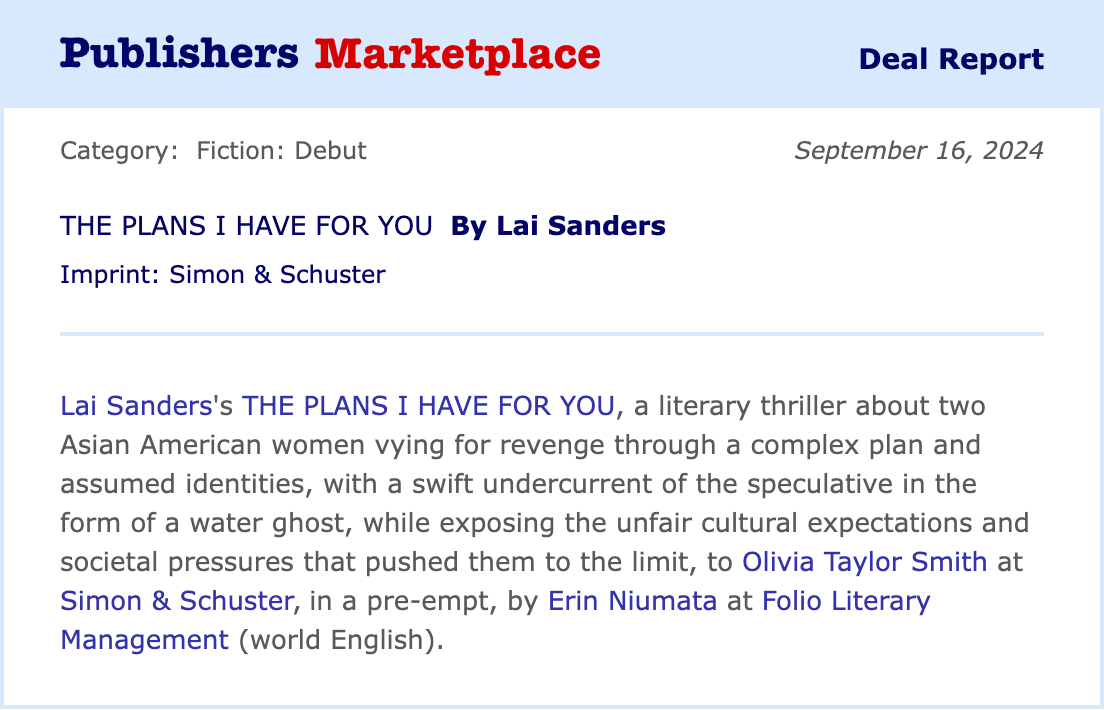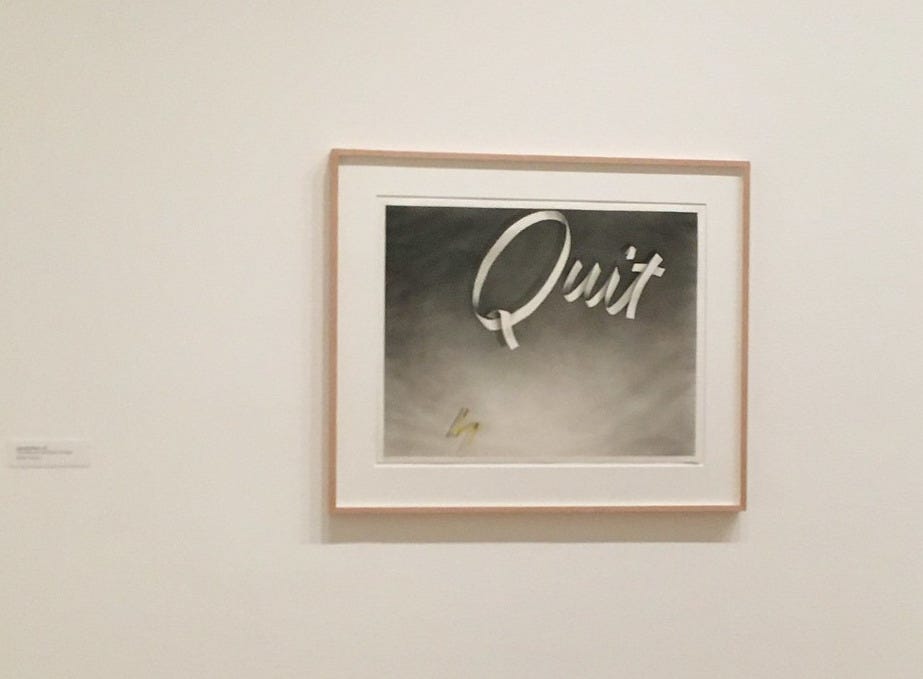How getting rejected by 90+ literary agents helped me get a book deal
The story behind selling my debut novel THE PLANS I HAVE FOR YOU to Simon & Schuster
Earlier this year, I was talking to my boss’s boss when he mentioned that he’d read an article in The Guardian about a writer who’d been turned down by some forty-odd literary agents. “Did you get that many rejections when you were trying to find an agent for your book?” he asked, the kind and supportive man that he is.
Bro! I almost shouted. I got over ninety! Why do you think I went into a depressive episode and had to go into cognitive behavioral therapy?!
I can laugh about it now, but for a while there, it was really, really soul-crushing. I’ve dreamed of being a published author since I was old enough to read. When I was in university from 2009 to 2012, however, I made the difficult call to change my major from English to business because I was so worried about graduating into the recession. I spent the next half-decade juggling low-paying nonprofit jobs, grad school, and almost $60k in student loans. I didn’t have the time or the mental space for writing.
By 2020, though, two things had changed. The first was that I had moved to Switzerland and was being paid, for the first time in my life, a fair salary that allowed me to feel like I wasn’t drowning in constant financial stress. The second was that I was fed up. I’d spent much of the last decade working for a slew of progressive organizations with shiny, grandiose mission statements—human rights, climate change, equality for women and marginalized communities—that were absolute nightmares behind the scenes. The dysfunction. The racism. The breathtakingly exploitative labor practices. I needed a place to channel my anger and frustration, and I found it in creative writing.
I wrote on nights and weekends, pouring my heart into a satirical novel about toxic nonprofit work culture and the crushing futility of giving your all to a job that exploits your passion for iMpRoViNg tHe sTaTe oF ThE WoRlD but offers little more than heartbreak in return. I sent it to scores of literary agents, hoping to find someone who’d resonate with the story and want to shop it around to publishers. No one did.
I wrote a second novel and tried again. No luck this time, either.
The daily stream of rejections in my inbox was a huge shock to the system, and at first, I couldn’t figure out how to emotionally handle them. I remember walking through a museum one day in late 2023, thinking about the latest rejection that had arrived that morning, and I started crying in the middle of the exhibit like a weirdo because I was so emotionally exhausted. What’s the point? I thought. I’ll never be published. Every time I try and put my work (and me, by extension) out there, I’m just bringing more rejection and disappointment down on myself.
That week, I was back in the United States on home leave, staying at a hotel in NYC. I was in a really defeated, vulnerable place. I hadn’t felt this worthless and just… resoundingly, universally unwanted since I was eighteen years old, when I was rejected by almost every university I applied to. Except I wasn’t eighteen anymore; by then I was in my thirties, with a master’s degree, a career, and a long decade full of challenges and failures and disappointments behind me.
So why did it hurt so much, still?
That night, in my hotel room, the bones of an entire story flooded into my mind, fully formed. What if there was a girl who, rejected by every single college, was driven to do something unimaginable, something that destroyed her life? And what would happen if she ended up sitting in the lobby of a hotel a decade later, talking to a younger woman who’d found herself in a similarly hopeless situation? Pushed over the edge by the pressures of family and society, how far could two ordinary women let their rage and their trauma take them?
It took only two months to get the first draft down on paper. I finished the novel in early 2024 and began sending it out to literary agents. The process of putting myself out there again filled me with dread. I felt like a pervy raccoon crawling out of a dumpster, trying to sneak back onto the porch of someone who’d already shooed me away.
This was the query letter I wrote:
I'm submitting for your consideration THE PLANS I HAVE FOR YOU, a 91,000-word work of contemporary upmarket fiction. Similar to Kirstin Chen's Counterfeit, it features two morally grey Asian American women who team up to run a brazen scam, while also including light fabulist horror, a complex queer relationship, and—above all—feminine rage.
Shelley Hu's life is over. Or so she thinks. When a squabble with a fellow passenger spirals into a humiliating nervous breakdown on the 6 Train, the resulting viral video costs Shelley her internship at a prestigious Manhattan law firm, her spot at Columbia Law, and her dreams of building a better life for herself and her mom.
Months later, Shelley is back at her high school job in Florida, working the night shift at a motel near Disney World. When she checks in Sophia Moon, a softspoken suburban mom vacationing with her husband and young son, Shelley thinks little of it. But to her surprise, Sophia divulges that she, too, had once starred in her own episode of public shaming more than a decade ago.
Sophia says that she's since picked up the pieces and built a new life for herself. She says she can help Shelley do the same—and what's more, she can help Shelley dish out some much-needed accountability to the three people responsible for the worst day of her life.
With Sophia's help, Shelley soon returns to NYC with a new name, a bulletproof disguise, and a set of plans. Plans that seem to be coming along nicely—until one by one, the targets of their little scheme start dropping dead.
Sophia says she has nothing to do with the deaths, which are tragic accidents, and of course Shelley believes her. Sophia is Shelley's guardian angel, her confidante, her soulmate; she'd never keep secrets from her. But as the situation spins out of control and the lies unravel, Shelley is forced to confront the unspeakably dark side to Sophia that had been right in front of her all along.
About me: I live in Switzerland, where I work full-time in communications for a nonprofit.
In February, I sent a query to Erin at Folio after seeing an online comment that said she was partial to revenge stories. Her colleague, Jess, found it in the slush pile, and they asked to see the full manuscript. We started working together in March. Erin and Jess read draft after draft and gave thoughtful feedback that strengthened the story I was trying to tell while staying true to my vision. Their colleague from Folio, Sharon, also read and provided excellent notes on one of the drafts. Together, they helped me reshape The Plans I Have for You into what it is today: a story that is darker and angrier and even more unhinged than what I’d set out to write. It became a story that was good enough and weird enough to get Olivia’s attention and find a home with S&S.

At its core, The Plans I Have for You is a book about rejection. It asks painful questions like: what does it mean to be rejected as a child? A friend? A lover? A daughter in a culture that favors sons? An unconnected young person trying to get past the gates of an elitist, nepotistic institution? And what the hell are you supposed to do when you are rejected by a whole career or a calling?
Publishing is so strange and hard. It really is. The cold reality is that most writers will never be able to find an agent. And many writers who do find agents are not able to sell that book, even if they’ve written a brilliant story. It’s not enough to have written a good book, because so much of it is luck. It’s subjective taste. It’s timing. It’s the ever-changing whims of The Market and algorithms and sales figures for other books that are comparable to yours. Writing a book that is “too quiet” or “can’t sell” says nothing about the quality of your work (Shuggie Bain, anyone? A Confederacy of Dunces?). And writing a book that does suck and needs to be put back in the drawer doesn’t mean you don’t have the capacity to learn and grow. Rejections are business decisions that are not linked to your worth as a person. It took me a while, but I see that now.
As an author, there are so many things I can’t control. I can’t make the New York Times review my book. I can’t force readers to buy copies. I certainly can’t manifest my way onto a bestseller list or any other enviable marker of success. And after stressing over the publishing process for so long, arriving at the realization that so much is out of my hands has been oddly liberating. Because despite everything else, there is one thing I can control: whether or not to keep writing.
Maybe I’ll get lucky again. Maybe I won’t. But I will hunch over my laptop like the sneaky raccoon that I am and keep writing.
P.S. If you’re interested in hearing more about my publishing journey as it unfolds, please consider subscribing to this newsletter. I’d be very grateful for the support. x


Oof. I racked up nearly 80 rejections—kind and encouraging, but rejections just the same. So I’ve decided to serialize my memoir on Substack, giving it the chance to finally be read.
Now, I’m deep into writing a novel, fully expecting to face the same rejection cycle all over again. But I just keep reminding myself—at least I’m still writing. At least I’m still doing the thing I love.
And wow—finishing a draft in two months is incredible! Congratulations on your book, and thank you for sharing your story.
loved this! my first novel died on submission, my agent and i parted ways after my second novel, and i'm about to finish my third novel and face querying again. i really appreciated reading about your journey!